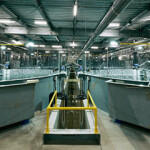Oceanium wins Thai Union Innovation Challenge; Notpla expands production of seaweed-based food containers

SeafoodSource is closely following seaweed innovation by compiling a regular round-up of updates from the sector.
- Oban, Scotland-based seaweed startup Oceanium was named the winner of the Thai Union Innovation Challenge for extracting value from sustainably farmed seaweed to produce plant-based foods.
The company was recognized at the 2023 Asia-Pacific Agri-Food Innovation Summit, which took place from 31 October to 2 November in Singapore. As the winner, Oceanium will receive assistance and technical expertise from the Thai Union Global Innovation Team.
Oceanium recently raised USD 2.6 million (EUR 2.4 million) for scaling and commercializing its seaweed processing operations.
- London, England-based food container company Notpla announced it has undertaken a brand refresh. Notpla produces containers using plastic replacements derived from plants and a seaweed base using regenerative materials.
The company, founded in 2019, has expanded its range of compostable, naturally disintegrating products to 10. According to its LinkedIn release, the product has been used more than three million times as an alternative to plastic.
“We’ve assembled a team of talented people, have formed amazing partnerships across multiple markets and we’ve achieved much-needed breakthroughs in policy,” the company wrote in its LinkedIn release. “In this time, the world around us has also grown, with other inspiring material innovators joining the mission: to help restore the health of our planet. For Notpla, it’s no longer just a case of creating packaging that disappears, now we must also create and enable change. Change that really means something to everyone, from businesses to consumers, to policy-makers and to our allies in seaweed materials.”
-The University of Massachusetts Boston and Dartmouth College have released results from a study on seaweed research looking at coastal pollution and its impacts.
The study shows how water pollution might have a negative impact on the food safety of sugar kelp. The research found that some sugar kelp contains high levels of certain heavy metals, but not yet enough to threaten human consumption.
“We do not believe that our results should alarm consumers of domestic seaweed products,” University of Massachusetts Boston School for the Environment Brianna Shaughnessy said in a release. “Rather, to put our findings in context, a person would need to eat 2,000 grams (4.5 pounds) of raw seaweed every day for 70 years to reach exposure levels of concern for cadmium, or 10,000 grams (22 pounds) every day for 70 years to reach exposure levels of concern for arsenic.”
The study's researchers urged the U.S. to develop evidence-based standards for seaweed safety that considers the way sugar kelp is processed for consumption.
Photo courtesy of Asia-Pacific Agri-Food Innovation Summit/LinkedIn






Share